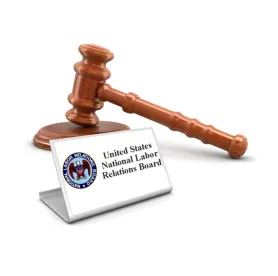On February 1, 2022, the General Counsel (“GC”) of the National Labor Relations Board (“NLRB”) announced a new initiative encouraging NLRB Regions to seek injunctive relief under Section 10(j) of the National Labor Relations Act (“NLRA” or “Act”) where workers have alleged unlawful threats or other coercion by employers during union organizing campaigns—even if the employer had not followed through on its threat or coercive action. This important announcement comes on the heels of the GC’s August 2021 Memorandum, illustrating the GC’s re-affirmation of the NLRB’s emphasis on seeking injunctive relief in federal court for certain urgent matters pursuant to Section 10(j) (discussed previously here), and the November 2021 Memorandum instructing Regions to seek full and immediate remedies regarding immigration-related threats and retaliatory conduct at every stage of an unfair labor practice case, including 10(j) injunctive relief.
As brief background, Section 10(j) of the Act allows the Board to seek temporary injunctions in federal court while cases are being litigated in order to ensure that any remedy the Board might issue would not be moot or hollow. Cases where 10(j) injunctions may be appropriate are first identified by the Region processing the underlying charge, then referred to the GC, and the GC must then obtain Board authorization before seeking an injunction in federal court.
In her Memorandum describing the new initiative, the GC explained that injunctive relief under 10(j) is typically sought once an employer has already followed through on its threats to terminate union supporters or take other adverse action against employees. Under the new initiative, however, Regions are encouraged to consider seeking injunctions “immediately after determining that workers have been subject to threats or other coercive conduct during an organizing campaign, before an employer follows through on its threats or coercion.” According to the GC, “threats or other coercive conduct need to be promptly stopped, not only to erase the chilling impact they have on employees, but to prevent escalation of the words into action.”
The Memorandum requests that the Regions promptly investigate threats or other coercive conduct made during a union organizing drive and immediately submit those cases for consideration of injunctive relief—even in the absence of any employee discharges or other alleged violations under Section 8(a)(3) of the NLRA.
In addition, the GC advised that the NLRB’s Section 10(j) Manual will be updated to include “cases where employers swiftly react to organizing efforts with threats or coercion, even in the absence of other unlawful action,” to the list of cases appropriate for Section 10(j) injunctions.
Based on this Memorandum, the GC intends to expand the use of 10(j) injunctive relief during organizing campaigns purportedly to avoid “irreparable harm” suffered by the employees under the circumstances outlined above. The stated goal of the policy is to enjoin an employer’s conduct in such a manner that would prevent the escalation of unlawful threats or coercive conduct that would ultimately harm the employees’ Section 7 rights.
Since 10(j) injunctions are litigated directly in federal district courts—not before an Administrative Law Judge and then the Board, with the right to appeal to federal circuit courts, like the manner in which the merits of an unfair labor practice charge are litigated—the federal district and appellate courts will ultimately have the last word on whether the conduct outlined by the GC in the Memorandum warrants the extraordinary remedy of injunctive relief.
We will keep you posted.




 />i
/>i

